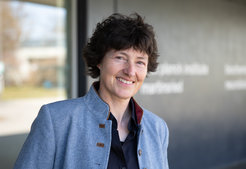ERC Synergy Grant for biophysicist Petra Schwille
Petra Schwille, Director at the Max Planck Institute (MPI) of Biochemistry in Martinsried, together with Bert Poolman, Professor of Biochemistry at the University Groningen, Netherlands, receives an ERC Synergy Grant for the MetaDivide project.
What is a cell? The biophysicist Petra Schwille and the biochemist Bert Poolman are dedicated to answering this question. They are world leaders in the research field of synthetic biology. Both are recreating cellular systems with just a few components in order to understand the fundamental processes of life. While Petra Schwille focuses on cell division, Bert Poolman's research focuses on metabolic processes. In the MetaDivide project, they now want to use their complementary expertise to recreate a minimal cell-like system that can divide autonomously and produce the energy to do so itself. The scientists will be funded by the European Research Council (ERC) with a total of 5 million euros over a six-year period.

How does life work in its simplest form? Delving into the biological details, this fundamental question for scientists is still unanswered in many aspects today. The cell, the smallest unit of life, is characterized by its separation from its environment, genetic reproduction, metabolism, growth, development and the ability to react to stimuli.
Petra Schwille and Bert Poolman have been studying the basic principles of life for many years – with complementary questions and research approaches. Both scientists work in the field of synthetic biology and try to construct simple biological systems “from scratch”, i.e., bottom-up, by combining and arranging individual, biochemical components in a controlled manner. Building a minimal cell from inanimate components is a dream of synthetic biology to this day.
Petra Schwille and her team have been investigating for many years which and how many components are needed for a cell to divide. To do this, they produce artificial cell envelopes. With these biological membranes, proteins produced in the laboratory interact in such a way that they enable division.
Bert Poolman, a biochemist at the University of Groningen in the Netherlands, is working on minimal metabolism. He is investigating how molecules permeate biological membranes and how the volume and the physicochemistry of the cell are controlled. He is also addressing the question of the minimum tasks that a living cell should perform and how these can be achieved with a minimal set of components.

In the MetaDivide project, Petra Schwille and Bert Poolman and their teams plan to use inanimate components, i.e., proteins and biological membranes, to create an artificial cell about the size of a bacterium that shows partial aspects of life. To do this, self-organizing membrane-active protein machines must be enclosed in the cell and driven by a self-sustaining metabolism. The artificial cell should be able to maintain a physicochemical balance and divide independently. The integration of membrane biology and minimal metabolism research in a biological system will provide scientists with a new understanding of the basic principles of life.
About Petra Schwille
Petra Schwille studied physics and philosophy at the universities of Stuttgart and Göttingen. She did her doctorate under Nobel Prize winner Manfred Eigen at the MPI for Biophysical Chemistry in Göttingen (now MPI for Multidisciplinary Sciences). After a postdoc stay at Cornell University, Ithaca, New York, USA, she returned to the MPI for Biophysical Chemistry in Göttingen, Germany, in 1999, where she headed her own junior research group. In 2002, she accepted the Chair of Biophysics at the Biotechnology Center (BIOTEC) of the Technical University of Dresden, which she held until April 2012. Since 2011, Petra Schwille has been Director at the MPI of Biochemistry and heads the research department “Cellular and Molecular Biophysics”. In 2012, she also became an honorary professor at the Faculty of Physics at LMU. Petra Schwille has been honored with numerous awards, including the Gottfried Wilhelm Leibniz Prize 2010 of the German Research Foundation and the Otto Warburg Medal of the GBM in 2022. She is a recipient of the Bavarian Maximilian Order and the Cross of Merit First Class of the Federal Republic of Germany. In addition to her scientific activities, Petra Schwille is often invited as an expert on scientific, philosophical and social topics at cultural events and is very active in mentoring young scientists.
ERC Synergy Grants
The highly competitive ERC Synergy Grants are a very highly endowed funding instrument in Europe. They enable a team of top researchers to bring together complementary skills, ideas, knowledge and infrastructures to jointly explore some of the most exciting and competitive questions in modern science.
Further information: https://erc.europa.eu/apply-grant/synergy-grant












